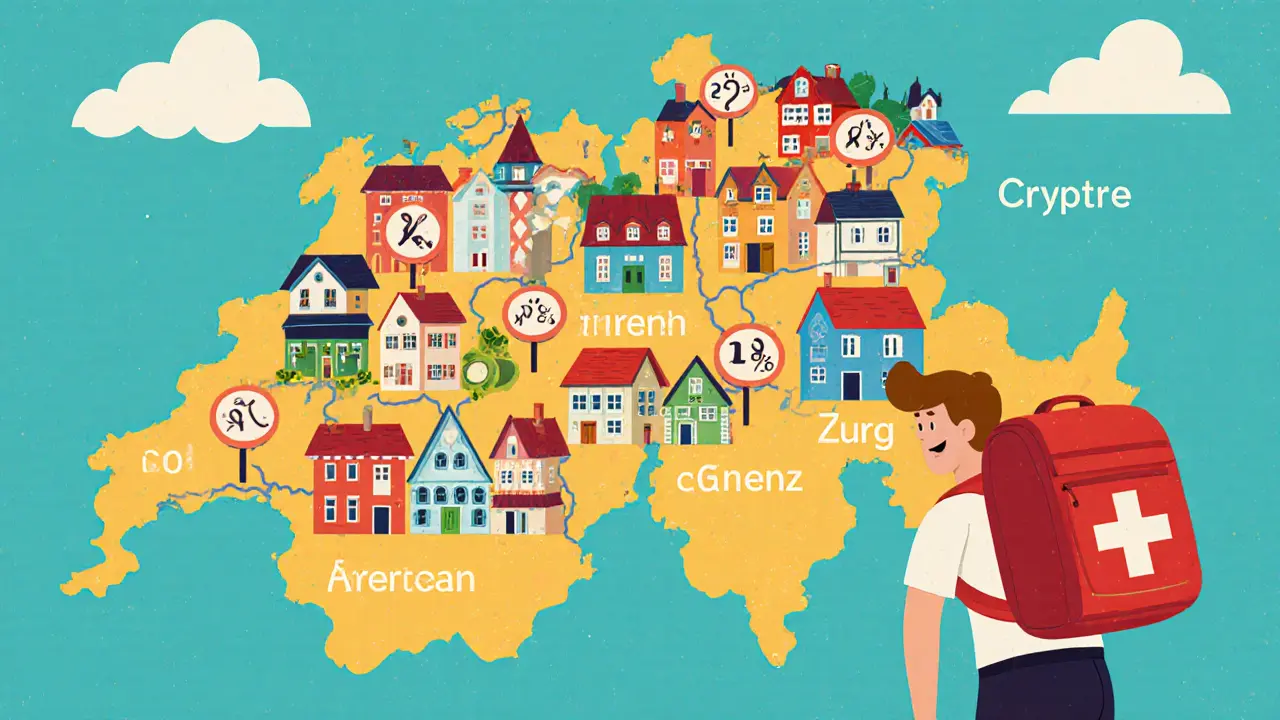Swiss Crypto Wealth Tax Calculator
Calculate Your Annual Wealth Tax
Your Annual Wealth Tax
Enter your crypto value and select a canton to see your annual wealth tax.
Switzerland doesn’t tax your crypto profits. Not even a cent. But here’s the catch: you still have to declare every single coin you own at the end of the year. And if you miss it, the penalties can be steep. This isn’t about avoiding taxes - it’s about playing by rules that are clear, fair, and uniquely Swiss.
How Switzerland Sees Your Crypto
Switzerland doesn’t treat Bitcoin or Ethereum like cash. The Federal Tax Administration (FTA) calls them crypto-based assets. That means they’re grouped with stocks, bonds, and gold - as part of your personal wealth, not income. This distinction is everything. It’s why you don’t pay capital gains tax when you sell your Bitcoin for a 10x profit. In most countries, that’s a taxable event. In Switzerland, it’s not - as long as you’re not a professional trader.
The FTA laid this out clearly in 2019 and updated it in 2021. They don’t care if you bought your first Bitcoin in 2017 or mined it last week. What matters is: are you an investor or a business? If you’re holding crypto like you’d hold shares in Apple - waiting, watching, occasionally selling - you’re a private investor. And private investors in Switzerland pay zero capital gains tax on crypto.
What You Must Declare: The December 31 Deadline
Every year, by December 31, your crypto holdings become part of your taxable wealth. That’s right - even if you didn’t sell a single coin, you still owe a wealth tax on what they’re worth on that day. The FTA publishes official year-end prices for major coins like Bitcoin, Ethereum, Litecoin, and Ripple. You must use those numbers to convert your holdings into Swiss francs.
But what if you hold something obscure - say, a new DeFi token or a small-cap altcoin? The FTA doesn’t list every token. In those cases, you use the price from the exchange where you traded it last. If you didn’t trade it at all? Then you use what you originally paid for it. No guesswork. No estimates. Just purchase cost in CHF.
For example: You bought 0.5 ETH for 1,200 CHF in 2023. By December 31, 2025, it’s worth 3,500 CHF. You declare 3,500 CHF. You don’t pay tax on the 2,300 CHF gain. But you do pay wealth tax on the full 3,500 CHF.
Cantonal Wealth Tax Rates: Where You Live Matters More Than What You Own
Switzerland has 26 cantons. Each sets its own wealth tax rate. That means two people with identical crypto portfolios can pay wildly different amounts - just because one lives in Zurich and the other in Zug.
Most cantons charge between 0.3% and 1% annually on total net wealth. Zurich leans toward the higher end - around 0.8% to 1%. Zug and Lucerne are often lower, sometimes under 0.5%. The tax is calculated on your entire net worth: property, savings, stocks, and crypto - minus debts.
That’s why many crypto investors in Switzerland don’t just pick a canton - they strategize about it. Moving from Geneva to Schwyz can save you hundreds or even thousands of francs a year. It’s legal. It’s common. And it’s one of the biggest advantages of living here.

Professional Traders Pay Up - Here’s How They’re Defined
Not everyone gets a free pass. If you’re trading crypto daily, running a crypto hedge fund, or making your main income from flipping tokens, you’re not a private investor. You’re a professional trader.
The FTA uses Circular No. 36 to define professional activity. Factors include frequency of trades, time spent, reliance on crypto income, and whether you use leverage or derivatives. If you’re trading more than 10 times a month and it’s your primary income source? You’re likely classified as a business.
Professional traders pay income tax on crypto gains - not wealth tax. That means gains get added to your salary and taxed at progressive rates: federal (up to 11.5%), cantonal (varies), and municipal (varies). In high-income cantons like Geneva, total tax rates can hit 40%+ on crypto profits. That’s the trade-off: no wealth tax on your holdings, but heavy income tax on your activity.
Token Types Matter: Payment, Utility, Security
Not all crypto is treated the same. Switzerland uses FINMA’s classification system:
- Payment tokens (like BTC, LTC): Treated like cash equivalents. Included in wealth tax, exempt from capital gains.
- Utility tokens (like Filecoin, Basic Attention Token): Depends on function. If they give access to a service, they’re usually treated like payment tokens. If they’re tied to profit-sharing, they may be classified as securities.
- Security tokens (like tokenized stocks or bonds): Treated like traditional securities. Wealth tax applies. Capital gains still exempt for private investors - but dividend-like payouts are taxed as income.
Staking rewards? If you’re earning ETH from staking, the rewards are considered income - not capital gain. You pay income tax on them. Mining income? Also taxable as business income. DeFi yields? Same rule. If it’s recurring, it’s income. If it’s just price appreciation, it’s wealth.

Why This System Works - And Why It’s Hard to Beat
Switzerland’s approach is simple: don’t punish holding. Don’t tax luck. Don’t confuse wealth with income. That’s why it’s one of the few places where you can hold crypto long-term without worrying about a tax bill every time the market moves.
Compare that to Germany, where holding crypto for over a year still triggers tax on gains. Or the U.S., where every trade is a taxable event. Or France, where you pay 30% flat on all crypto profits. Switzerland doesn’t just have low taxes - it has smart taxes.
Experts from Koinly and Ark-fid.ch confirm this in their 2024 reviews: Switzerland remains the most investor-friendly jurisdiction for crypto. No new digital asset tax. No blockchain-specific surcharge. No retroactive rules. The system has stayed consistent since 2019, and there’s no sign it’s changing in 2025.
The Real Challenge: Record Keeping
The good news? You don’t pay capital gains tax. The bad news? You need perfect records.
Every purchase. Every transfer. Every exchange. Every wallet address. You need to track the date, amount, price in CHF, and source. For lesser-known tokens, you might need to screenshot exchange prices from December 31. If you used a decentralized exchange like Uniswap, you need to export your transaction history and convert each swap to CHF at the time.
Many Swiss crypto holders use tools like Koinly, CoinTracker, or CryptoTaxCalculator to auto-import transactions from exchanges and generate the FTA-compliant report. Manual tracking is possible - but risky. One missed transaction can trigger an audit.
And audits happen. The FTA cross-checks data from Swiss banks, exchanges like Coinbase and Kraken (which report to Swiss authorities), and even blockchain analytics firms. If your declared wealth doesn’t match your lifestyle, they’ll ask questions.
What’s Next? Stability, Not Change
Switzerland isn’t rushing to change anything. The DLT Act of 2021 gave crypto legal clarity. The FTA’s guidance since then has been consistent. The Swiss Blockchain Federation reports record growth in crypto startups - and most cite the tax system as their top reason for setting up there.
Even NFTs, DeFi protocols, and tokenized real estate fall under existing rules. No new laws needed. That’s the power of a technology-neutral framework. As long as your asset has value, it’s subject to wealth tax. How you earn it? That determines if it’s income or gain.
There’s no indication Switzerland will introduce capital gains tax on crypto. No political party is pushing it. The economy benefits from crypto talent and capital flowing in. Changing the rules would be economic suicide.
So if you’re holding crypto in Switzerland - and you’re not trading it like a day trader - you’re in one of the best places on earth. You pay a small wealth tax. You keep 100% of your gains. And you do it under a system that’s transparent, stable, and built for the long term.
Do I have to pay tax on crypto gains in Switzerland?
No, private investors do not pay capital gains tax on cryptocurrency profits in Switzerland. Whether you made 1,000 CHF or 1 million CHF from selling Bitcoin, Ethereum, or any other crypto, you keep it all - as long as you’re not classified as a professional trader. This exemption applies to all private wealth assets, including stocks and bonds.
What if I don’t sell my crypto - do I still owe tax?
Yes. You must declare the value of all your crypto holdings as of December 31 each year as part of your personal wealth. Even if you never sold anything, you pay an annual wealth tax based on that value. The tax rate varies by canton, typically between 0.3% and 1% of your total net worth.
How do I value my crypto for Swiss tax purposes?
Use the official year-end prices published by the Swiss Federal Tax Administration (FTA) for major coins like Bitcoin and Ethereum. For lesser-known tokens, use the price from the exchange where you last traded them on December 31. If there’s no market price, use your original purchase cost in Swiss francs. Never estimate - use verifiable data.
Are staking rewards taxed in Switzerland?
Yes. Staking rewards, DeFi yields, and mining income are treated as taxable income, not capital gains. You pay income tax on these earnings at your regular cantonal and federal income tax rates. They’re not included in your wealth declaration - they’re reported separately as earned income.
Can I avoid wealth tax by moving to a different canton?
Yes. Wealth tax rates vary significantly across Switzerland’s 26 cantons. Moving from a high-rate canton like Geneva or Zurich to a lower-rate one like Zug, Schwyz, or Lucerne can reduce your annual crypto wealth tax by hundreds or thousands of francs. Many crypto investors relocate specifically for this reason - and it’s completely legal.
What happens if I don’t declare my crypto?
Failure to declare crypto assets can lead to penalties, interest charges, and even criminal investigation. Swiss authorities cross-check data from exchanges, banks, and blockchain analytics tools. Undeclared crypto is considered tax evasion. The FTA has increased enforcement in recent years - especially for high-net-worth individuals.
Is mining crypto taxable in Switzerland?
Yes. If you mine crypto as a business activity - even on a small scale - the income from mined coins is taxable as business income. You must report the value of mined coins at the time they’re received, and you may deduct related expenses like electricity and hardware. Private mining for personal use is rare and still subject to income tax if the activity is frequent or profitable.
Do I need to use a tax software tool for crypto in Switzerland?
Not legally required, but strongly recommended. Tools like Koinly, CoinTracker, or CryptoTaxCalculator help import transactions from exchanges, calculate year-end values, and generate FTA-compliant reports. Manual tracking is possible but error-prone. Given the complexity of multi-wallet, multi-chain holdings, software reduces audit risk and saves hours of work.

10 Comments
Switzerland’s system is basically the crypto version of zen Buddhism-don’t chase gains, just hold and breathe. No capital gains tax? Wild. In the US, I’d be sweating every time BTC moves 5%. Here, you just… exist with your coins. It’s not about wealth, it’s about freedom. I’m jealous. And honestly? Kinda makes me rethink my whole life.
Also, the fact they use official year-end prices? Genius. No guesswork. No chaos. Just clean, boring, Swiss math. I love it.
swiss are so lazy they just tax you for owning stuff instead of making you work for it. why not just let people keep all their crypto? why even declare? its 2025 not 1925. also canton hopping? lol. sounds like rich people playing monopoly with taxes. i dont care if its legal. its dumb.
As someone from India where crypto tax is 30% + 4% cess + TDS on every trade, this feels like a dream. In India, even if you just hold Bitcoin for 5 years and sell, the government takes a huge cut. Here in Switzerland, you’re not punished for patience. That’s not just smart policy-it’s human.
Also, the fact they treat utility tokens differently based on function? That’s actually sophisticated. Most countries just slap a blanket tax on everything crypto. Switzerland sees nuance. That’s rare. I wish my country had this level of clarity.
And yes, record keeping is a pain-but it’s a pain you *want* to have. It means you’re doing it right. I’ve seen too many people in India get audited because they didn’t track their trades. Here, you’re protected if you’re organized. That’s the real win.
They’re not letting you keep your crypto-they’re monitoring it. Every wallet. Every transaction. The FTA has access to every exchange, every blockchain, every damn address. This isn’t freedom-it’s surveillance with a smile. They don’t tax your gains, sure. But they know exactly how much you have. And they know when you move it. This is the quietest form of control I’ve ever seen. They don’t need to tax your profits. They just need to know you’re rich. And then they’ll come for you later.
Wait till they start taxing staking rewards as ‘passive income’ under new ‘digital asset stability’ laws. It’s coming. Trust me.
Let me break this down properly because most people miss the structural genius here. Switzerland decouples wealth from income. That’s not just tax policy-that’s economic philosophy. Capital gains are a reflection of market speculation, not labor or production. Wealth tax is a flat, annual levy on asset value, which is inherently less distortive than taxing transactions or realized gains. This aligns with the classical liberal view of property rights: you own it, you pay a small fee to maintain societal infrastructure, but you’re not penalized for appreciation.
Compare that to the U.S. system where every trade triggers a taxable event, creating massive behavioral distortions-like holding losers too long to avoid capital gains or selling winners prematurely. Switzerland avoids that entirely. The only downside? Record-keeping hell. But that’s a cost of transparency, not a flaw in the system.
Also, the cantonal variation? Brilliant federalism. It creates competition between jurisdictions, incentivizing efficiency. Zug isn’t ‘tax haven’-it’s a market-driven optimal policy outcome. That’s capitalism working.
Oh wow, so rich people get to pay less tax just because they live in the right canton? How original. And you call this fair? This is how the elite rig the system. You think a normal person can just up and move to Zug? Please. This isn’t tax policy-it’s class warfare dressed up as ‘smart economics.’ And don’t even get me started on staking rewards being taxed as income. They’re still taking your money. Just slower.
Switzerland isn’t crypto-friendly. It’s rich-people-friendly. And you’re all falling for it.
I’ve been holding crypto for years and never knew this was possible. This makes so much sense. I’m not a trader, I’m just someone who believes in the tech. The fact that Switzerland lets me hold without fear of being taxed every time the market moves… it’s calming. I don’t need to time the market. I just need to keep records. That’s manageable.
Also, the official prices from FTA? That’s actually kind of beautiful. No guesswork. No stress. Just clear rules. I wish more places did this.
The distinction between wealth tax and capital gains tax is foundational to understanding modern fiscal policy. Wealth tax is a stock variable-measured at a point in time. Capital gains tax is a flow variable-triggered by transactional events. Switzerland’s model internalizes the externality of asset concentration without disincentivizing long-term investment. It’s a Pareto-efficient outcome relative to the U.S. or German models, which impose high transactional friction on asset reallocation.
Furthermore, the cantonal variation creates a dynamic policy lab. The optimal tax rate emerges through inter-jurisdictional competition, not top-down imposition. This is Hayekian spontaneous order applied to taxation. The fact that they classify tokens by function rather than by blockchain protocol demonstrates epistemic humility-they don’t presume to understand the technology, only its economic function. That’s rare.
Just hold. Don’t trade. Track. Done.
Switzerland got it right.
Love how Switzerland treats crypto like real assets-not magic internet money. In India, we’re still arguing if it’s even legal. Here, they just say: ‘Here’s the rule, follow it, and you’re fine.’ No drama. No panic. Just clear, calm, consistent policy. That’s the real gift. And yeah, moving cantons? Totally normal. My cousin did it last year. Saved him 2k CHF. No one blinked. That’s culture, not corruption.
Also, Koinly? Life saver. I used to do it by hand. Now I just export and click. Five minutes. Done. No stress.